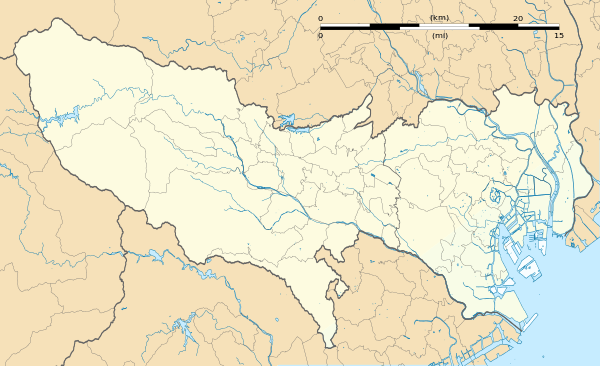Higashi-Murayama Station
Higashi-Murayama Station (東村山駅, Higashi-Murayama-eki) is a railway station in Higashimurayama, Tokyo, Japan, operated by the private railway operator Seibu Railway.
SS21 SK05 Higashi-Murayama Station 東村山駅 | |
|---|---|
The east entrance, July 2015 | |
| Location | 2-3-32 Honchō, Higashimurayama-shi, Tokyo (東京都東村山市本町2-3-32) Japan |
| Operated by | |
| Line(s) | |
| Platforms | 3 island platforms |
| Connections |
|
| Other information | |
| Station code | SS21, SK05 |
| History | |
| Opened | 1894 |
| Traffic | |
| Passengers (FY2014) | 46,831 daily |
| Location | |
 Higashi-Murayama Station Location within Tokyo | |
Lines
Higashi-Murayama Station is served by the Seibu Shinjuku Line, the Seibu Kokubunji Line, and the Seibu-en Line. It is 26.0 km from the Tokyo terminus of the Seibu Shinjuku Line at Seibu Shinjuku Station and 7.8 kilometers from the terminus of the Seibu Kokubunji Line at Kokubunji Station.[1] All trains including limited express services stop at this station.[2] It is also the terminus station of the Seibu-en Line.
Station layout
Higashi-Murayama Station has two entrances, east and west, with one set of ticket barriers located centrally above the tracks. The platforms are connected by three overhead passageways. The station has three island platforms serving six tracks.
Platforms
| 1/2 | ■ Seibu Kokubunji Line | for Ogawa and Kokubunji |
| 3 | ■ Seibu Shinjuku Line | for Tokorozawa and Hon-Kawagoe |
| ■ Seibu Seibu-en Line | for Seibuen | |
| 4 | ■ Seibu Shinjuku Line | for Tokorozawa and Hon-Kawagoe |
| 5/6 | ■ Seibu Shinjuku Line | for Tanashi, Takadanobaba, and Seibu Shinjuku |
 The west side of the station, September 2009
The west side of the station, September 2009- The ticket barriers, July 2015
- The platforms, July 2015
Adjacent stations
| ← | Service | → | ||
|---|---|---|---|---|
| Seibu Shinjuku Line | ||||
| Takadanobaba | Koedo limited express[2] | Tokorozawa | ||
| Tanashi | Commuter express | Tokorozawa | ||
| Kumegawa | Express | Tokorozawa | ||
| Kumegawa | Semi express | Tokorozawa | ||
| Kumegawa | Local | Tokorozawa | ||
| Seibu Kokubunji Line | ||||
| Ogawa | Local | Terminus | ||
| Seibu Seibu-en Line | ||||
| Terminus | Local | Seibuen | ||
History
The station opened on 21 December 1894.[1]
Station numbering was introduced on all Seibu Railway lines during fiscal 2012, with Higashi-Murayama Station becoming "SS21" for the Shinjuku Line and "SK05" for the Kokubunji and Seibu-en Lines.[3]
Accidents
On 24 December 2011, at 16:40, the seventh car of an 8-car train forming a service from Seibuen to Seibu Shinjuku derailed as the train approached the station, blocking the line for the rest of the day. None of the approximately 450 passengers on board was injured in the accident.[4]
Passenger statistics
In fiscal 2014, the station was the 20th busiest on the Seibu network with an average of 46,831 passengers daily.[5] The passenger figures for previous years are as shown below.
| Fiscal year | Daily average |
|---|---|
| 2009 | 45,593[6] |
| 2010 | 45,786[6] |
| 2011 | 45,705[7] |
| 2012 | 46,347[8] |
| 2013 | 47,246[8] |
Surrounding area
To the east of the station is an Ito-Yokado department store, the Central Public Civic Hall, and Higashimurayama Central Post Office as well as Higashimurayama City Hall.
Buses for Tachikawa Station depart from the west side of the station. A bus departs from the east side to make a loop within Higashimurayama.[9] Taxis depart from both sides, also.
See also
References
- Terada, Hirokazu (July 2002). データブック日本の私鉄 [Databook: Japan's Private Railways]. Japan: Neko Publishing. p. 202. ISBN 4-87366-874-3.
- "停車駅のご案内". Seibu Railway. Archived from the original on 8 August 2013. Retrieved 5 August 2013.
- 西武線全駅で駅ナンバリングを導入します [Station numbering to be introduced at all Seibu stations] (PDF). News Release (in Japanese). Japan: Seibu Railway. 23 February 2012. Archived from the original (PDF) on 24 September 2015. Retrieved 2 April 2013.
- 鉄道事故:西武新宿線が脱線 一部区間、終電まで不通--東京・東村山駅 [Rail accident: Seibu Shinjuku Line partially closed due to derailment]. mainichi.jp (in Japanese). Japan: The Mainichi Newspapers. 24 December 2011. Archived from the original on 14 January 2012. Retrieved 25 December 2011.
- 駅別乗降人員 2014(平成26)年度 1日平均 [Average daily station usage figures (fiscal 2014)] (PDF) (in Japanese). Japan: Seibu Railway. Archived from the original (PDF) on 8 March 2016. Retrieved 17 July 2014.
- 駅別乗降人員 2010(平成22)年度 1日平均 [Average daily station usage figures (fiscal 2010)] (PDF) (in Japanese). Japan: Seibu Railway. Archived from the original (PDF) on 26 June 2011. Retrieved 18 July 2014.
- 駅別乗降人員 2011(平成23)年度 1日平均 [Average daily station usage figures (fiscal 2011)] (PDF) (in Japanese). Japan: Seibu Railway. Archived from the original (PDF) on 1 November 2012. Retrieved 18 July 2014.
- 駅別乗降人員 2013(平成25)年度 1日平均 [Average daily station usage figures (fiscal 2013)] (PDF) (in Japanese). Japan: Seibu Railway. Archived from the original (PDF) on 14 July 2014. Retrieved 18 July 2014.
- 東村山青葉恩多町線〜運行系統図. Ginga Tetsudo website (in Japanese). 2008. Archived from the original on 4 October 2011. Retrieved 25 December 2011.
External links
| Wikimedia Commons has media related to Higashi-Murayama Station. |
- Seibu Station information (in Japanese)